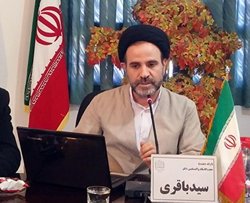 Hujjat al-Islam Sayyed-Baqeri said that the spirit of the Islamic-Iranian Blueprint for Progress is justice and argued, “If in some places and cases the document is not fair or weak, it must be strengthened.”
Hujjat al-Islam Sayyed-Baqeri said that the spirit of the Islamic-Iranian Blueprint for Progress is justice and argued, “If in some places and cases the document is not fair or weak, it must be strengthened.” RNA – Speaking at a conference entitled “The Position of Justice in the Islamic-Iranian Blueprint for Progress” which was held at the Culture Hall of the Islamic Culture and Islamic Research Centre, Hujjat al-Islam Sayyed Kazem Sayyed-Baqeri said that the spirit of this document is justice and argued, “If in some places and cases the document is not fair or weak, it must be strengthened.”
On October 14, 2018, the Supreme Leader of the Islamic Revolution, Ayatollah Khamenei, released a draft of the “Islamic-Iranian Blueprint for Progress,” a document in which the most important principles and ideals of progress and desired horizons for the next five decades are planned and effective strategies for realizing it are designed.
The faculty member of the Islamic Culture and Islamic Research Centre said we necessitate the criteria to recognize the inclusion of political justice in this document and noted, “Equality in opportunities and in rights, active participation by the citizens and the benefiting from that, universal freedom, equality of all before the law, the granting of political values appropriate to the activities of the citizens, the adoption and implementation of rules based on reason, transparent and responsible governance, respect for the rights of citizens, even opponents and critics and balances and moderation in political affairs are among those criteria.”
He added that some of these cases are mentioned in the Islamic-Iranian Blueprint for Progress and some are not as they should be. “For example, the most explicit part that deals with political justice is Article 45 which is part of the measures that emphasize the maintenance of religious democracy.”
Hujjat al-Islam Sayyed-Baqeri stated that the Islamic-Iranian Blueprint for Progress shows less progress than civil institutions and said, “This document is such that supposedly all the power is given to the government, while the root of many problems is the same point.”
He stated, “Wherever the power of a controlling force can’t be observed, it’s likely to lead to injustice, so instead of the dominating spirit in this document being government-based, the government must be civil society-based or any other name that they want to put there. Of course, this civil society is a civil society based in Islam.”
His Eminence added, “Alongside the government, which is an effective institution and planner of justice, what is essential is the commitment of the people to justice and bringing people and colleagues close to each other as is stated in the last verse of Surah Al Imran, when God speaks of patience, that is, everyone in society works together and strives to address justice and the related discussion in this verse is more important than patience.”
Hujjat al-Islam Sayyed-Baqeri explained that unlimited power is the beginning of injustice and said, “In Wilayat al-Faqih al-Mutlaqah (Absolute Power of the Jurisprudent), no one says that the Wali al-Faqih (Guardian-Jurist) has unlimited power, but rather it’s said that the powers of the Wali al-Faqih are wide enough to implement the affairs of the society and implement Islamic rules. The first limitation of the Wali al-Faqih is that he must act within the framework of Islamic laws and the interests of society and Islam and these are not quantitative restrictions.”
Rasa News Agency
112/973